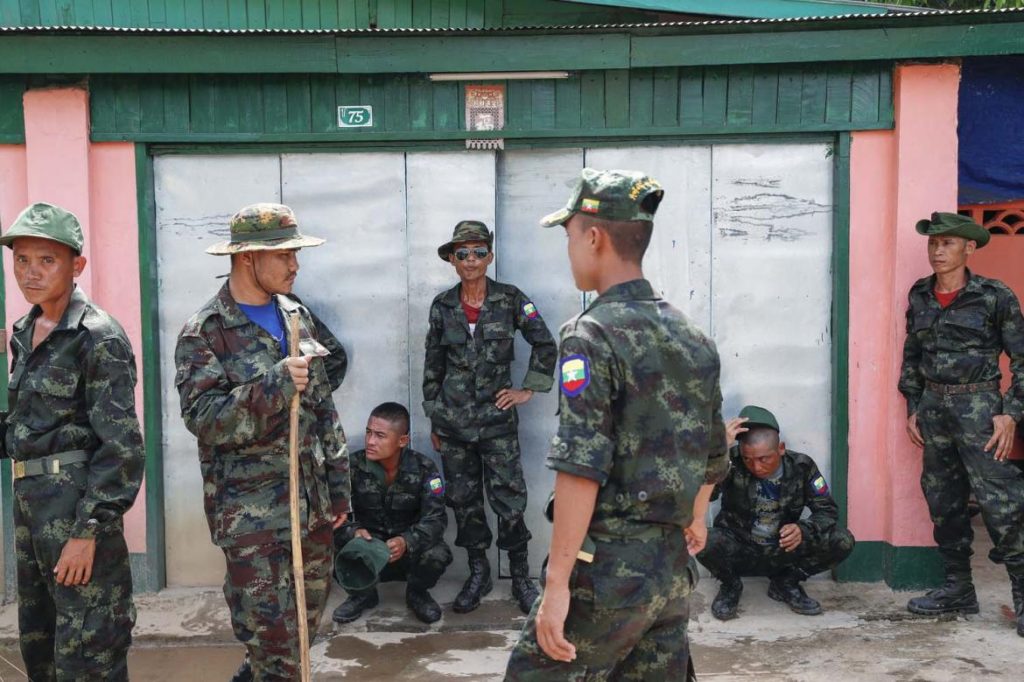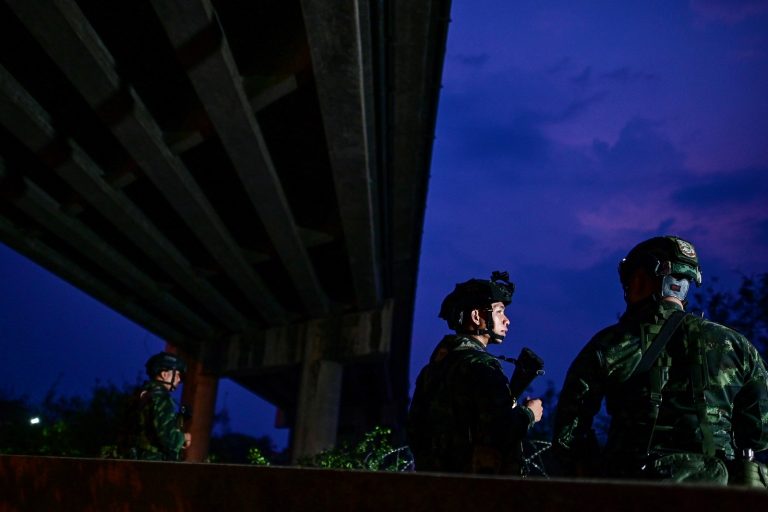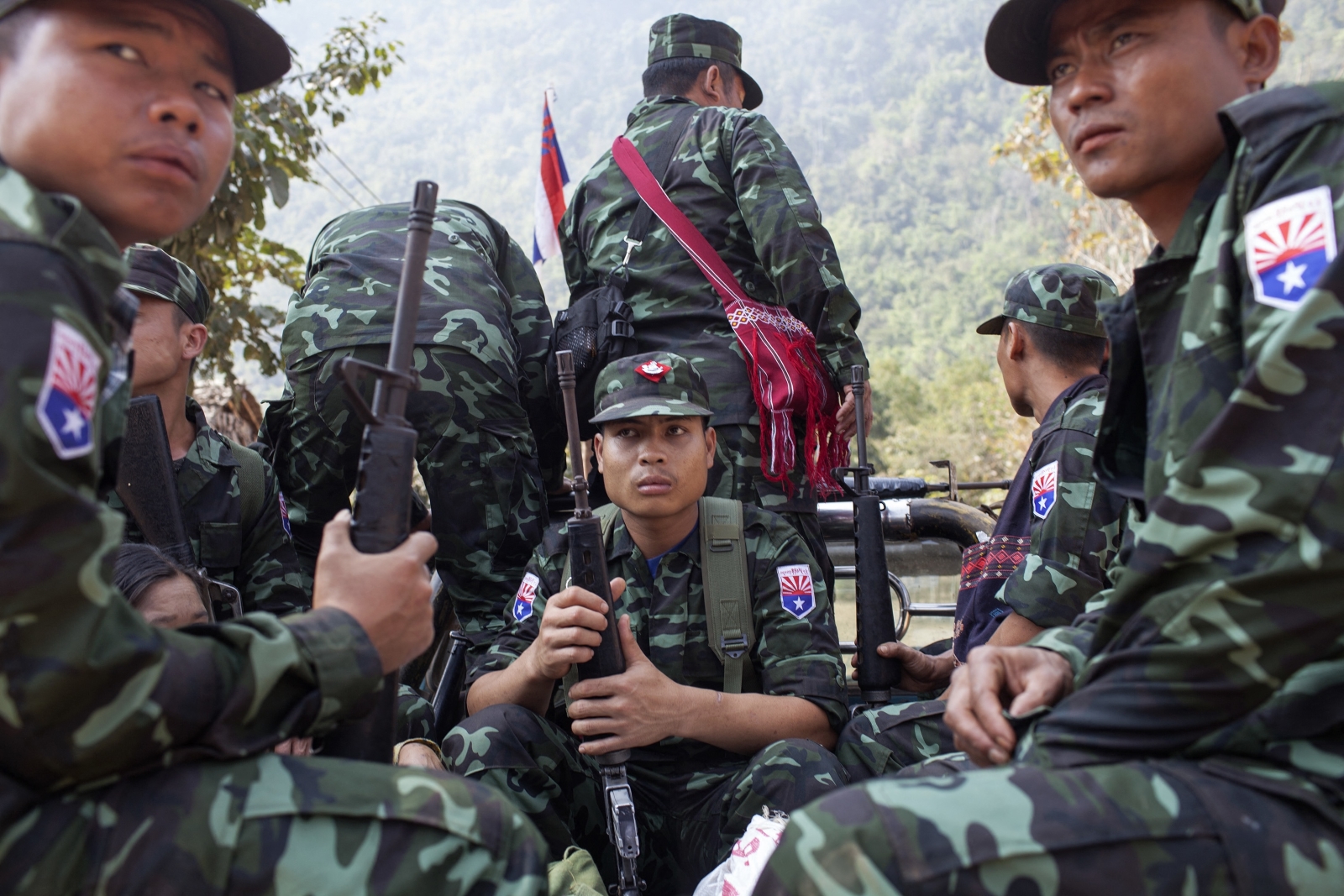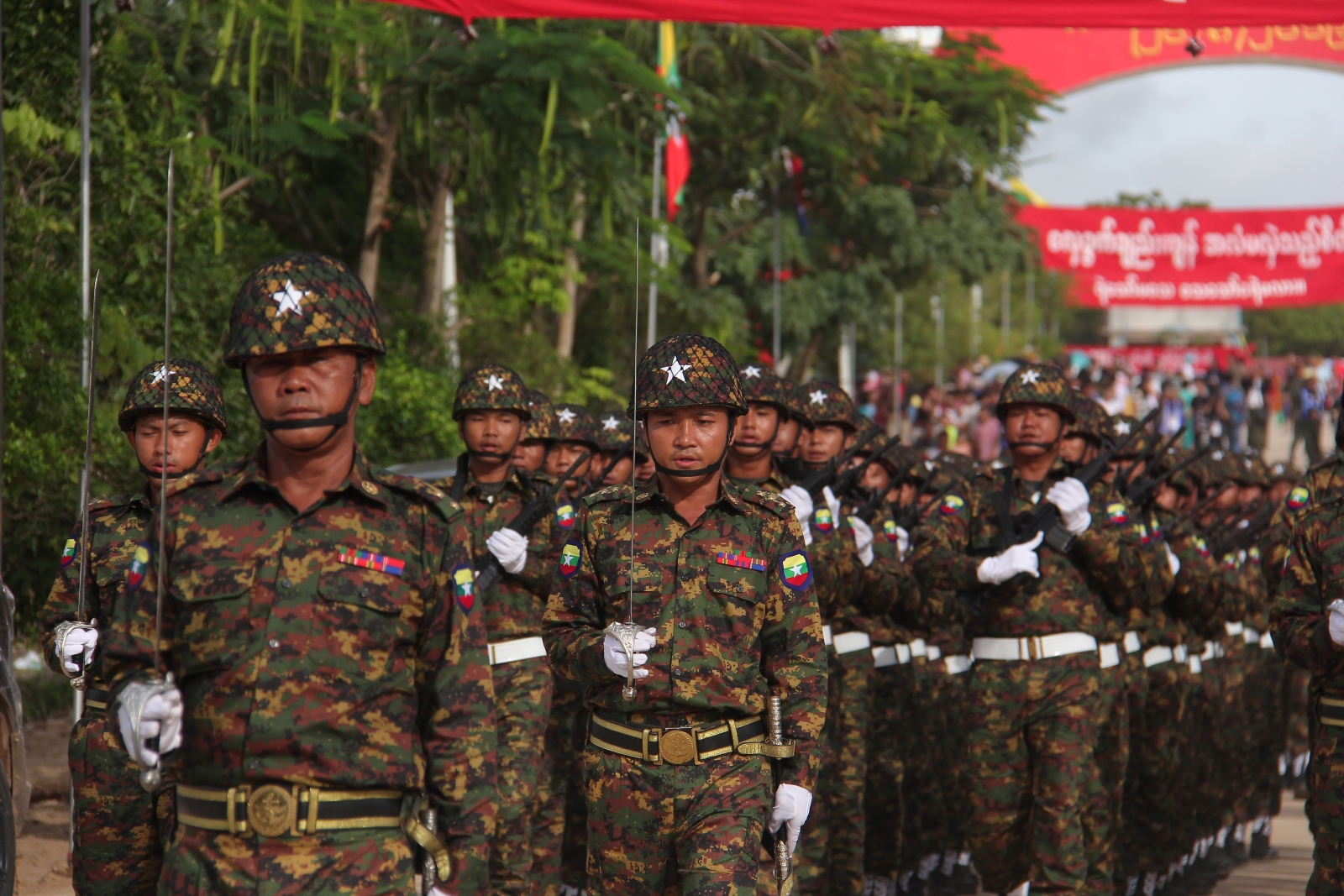A Border Guard Force and a Chinese company have teamed up to build a hi-tech city on the border north of Myawaddy, with seemingly little regard for Myanmar law and the livelihoods of the local Karen.
By NAW BETTY HAN | FRONTIER
Photos NYEIN SU WAI KYAW SOE
THE ROAD north from the busy trading town of Myawaddy, on the border with Thailand, passes through bucolic Karen villages. The road is flanked by fields of maize and rubber plantations, with trees stretching as far as the eye can see. The area is severely under-developed; villages lack electricity and the road is in such poor condition the 16-kilometre drive north to Shwe Kokko can take about two hours.
Shwe Kokko was once a village like the others in this area: sleepy, peaceful, inviting. It is now a massive construction site home to thousands of workers. Chinese investors are partnering with a local warlord to pump billions of dollars into the project, which is already reshaping this once quiet corner of the Thai-Myanmar frontier.
When it comes to the Shwe Kokko project – a self-described “special economic zone” that has already been dubbed the “Chinatown of Kayin State” on social media in Myanmar – sorting fact from fiction can be difficult. But one thing is certain: the developers have big plans.
But who is behind this project, and why would they choose this corner of Myanmar to develop a megacity from scratch?
Support more independent journalism like this. Sign up to be a Frontier member.
Shwe Kokko is being developed on a sweeping bend of the Moei River controlled by the Kayin State Border Guard Force. Formerly known as the Democratic Karen Buddhist Army, the group was rebranded as a BGF in 2010, when it came under Tatmadaw control. In exchange for its loyalty, the BGF has been allowed to develop significant economic interests, including a mix of licit and illicit businesses. Shwe Kokko would be the largest of the lot.
The Shwe Kokko project is a partnership between the BGF, led by Colonel Saw Chit Thu, and the Yatai International Holdings Group, which describes itself as being Bangkok-based and Hong Kong-registered.
The first rumours of the Shwe Kokko new city project emerged in 2016 and in December of that year Chit Thu and representatives of the Chinese company met Kayin State Chief Minister Daw Nang Khin Htwe Myint in Hpa-an.
After outlining their plans for Shwe Kokko, they were told that the state government could not approve the project because it involved an investment of more than US$5 million and were advised to apply to the Myanmar Investment Commission.
Despite having no permission from the government, work got underway in 2017, according to a BGF representative. On February 14, 2017, Myanmar Yatai International Holding Group Co Ltd registered with the Directorate of Investment and Company Administration and the same month reportedly signed a partnership agreement with Chit Thu that was facilitated by the Beijing-based China Federation of Overseas Chinese Entrepreneurs.
A planning proposal provided to Frontier by the BGF claims the project will cover an area of 72,843 hectares (180,000 acres) and entail spending of $15 billion. The plans for the project envisage a high-tech hub, with an airport, luxury housing, a 1,200-room hotel, casinos, an entertainment complex, supermarkets, department stores, police station, industrial zone, and freight depots. The Shwe Kokko project is believed to be the largest overseas investment by Yatai, which says it is expected to be completed in 2027.
The project’s location near Myawaddy, on one of the main highways linking Myanmar and Thailand, gives it the potential to benefit from increased connectivity in the region through the Asian Highway, as well as China’s Belt and Road Initiative. Myanmar Yatai said the project will be part of “an important economic corridor of the Belt and Road”.
Recent, much-needed upgrades to sections of the Asian Highway in Kayin State have been made possible by a reduction in conflict in the area after the Nationwide Ceasefire Agreement was signed in 2015. Proximity to Myawaddy has already benefited the project because construction materials are being sourced from Thailand.
In its planning proposal, Myanmar Yatai said the project is being implemented under the leadership of the Kayin State government and that the state administration approved interim provisions for the Myanmar Yatai Shwe Kokko Special Economic Zone on September 18, 2017.
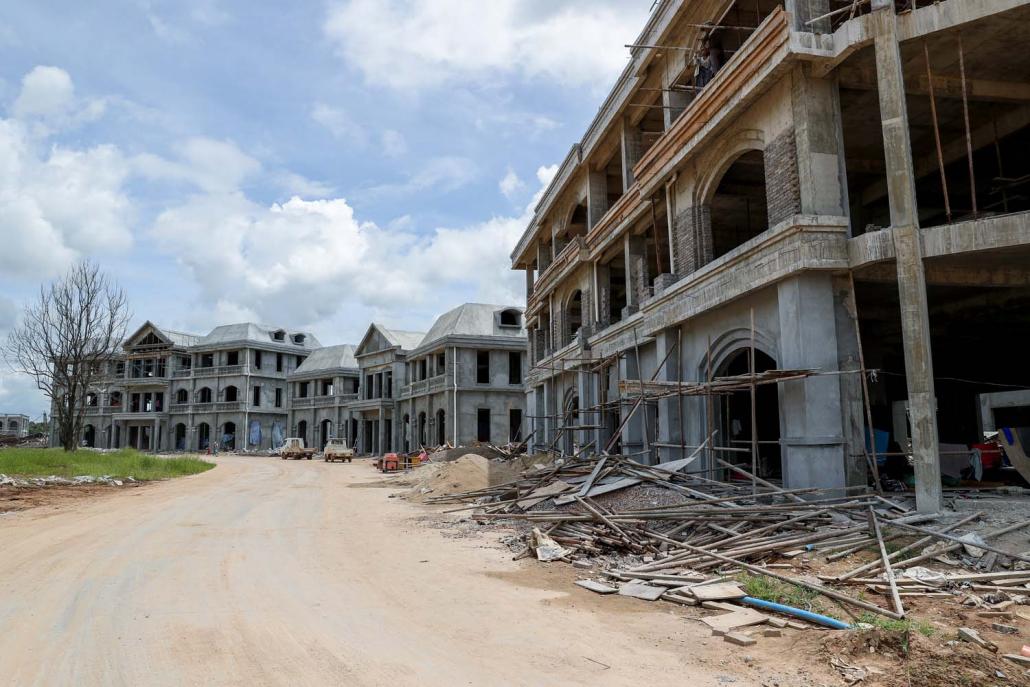
The government has approved a small housing estate project at Shwe Kokko but the BGF and Chinese investors have undertaken work far beyond this initial development. (Nyein Su Wai Kyaw Soe | Frontier)
Nang Khin Htwe Myint told Frontier on August 6 that the project had been under the leadership of her government, but since the Myanmar Investment Commission had approved the first phase it was the responsibility of Nay Pyi Taw.
She said there had been no further meetings between the developers and the state government since MIC approved the first phase of the project.
“The minister for security and border affairs and the minister for planning, finance and development are monitoring the construction process” on behalf of the state government, she added.
So far the company only has approval for a modest first phase that would see it build about 60 luxury villas on 10.3ha with an initial investment of $22.5 million by 2021. MIC approved this phase of the project on July 26, 2018, after receiving an application in April 2017.
DICA figures show that businesspeople from Cambodia and Malaysia, who are listed as directors of Myanmar Yatai, hold 67.88 percent and 12.31pc, respectively, in the $22.5 million first phase of the project. The BGF holds 20pc. A BGF official involved in the project told Frontier the Cambodian and Malaysian investors were ethnic Chinese. The developers have reportedly secured a 70-year lease from the Myanmar government, which may be extended to 99 years.
Reports, though, indicate that construction work is taking place far beyond the 59 villas that comprise phase one. According to Nang Khin Htwe Myint, the state government ordered the company in early 2019 to stop construction work outside the MIC-approved area.
The chief minister said Shwe Kokko residents had complained to the state government in April this year about the alleged illegal employment of thousands of Chinese workers on the project. She said the state Minister for Security and Border Affairs, Colonel Myo Min Naung – a serving Tatmadaw officer – had led a team that conducted surprise checks in the area the following month and had reported to cabinet that they found no illegal Chinese workers.
“They found out that there are about 100 Chinese workers who held passports” and were working legally, she said.
The surprise visit also enabled the minister to check if Myanmar Yatai had stopped construction work outside the project area approved by the MIC.
“When the minister checked the project area, work was only taking place in the MIC-approved area,” the chief minister said.
The minister for security and border affairs was evidently unlucky – or lucky, depending on how you look at it – because when Frontier visited on July 20 work was taking place across a broad area at Shwe Kokko, much of it outside the MIC-approved area, and there were at least several hundred Chinese workers present.
Frontier was able to visit the project site with an escort from the Kayin State Border Guard Force, which is a partner in the ambitious development. The escort, Major Saw Maung Win, is the BGF spokesperson for the project and an aide to Chit Thu, the powerful head of the force.
Frontier travelled in Maung Win’s car because outsiders’ vehicles are not allowed in the main construction site, which is about a five-minute drive from Shwe Kokko village.
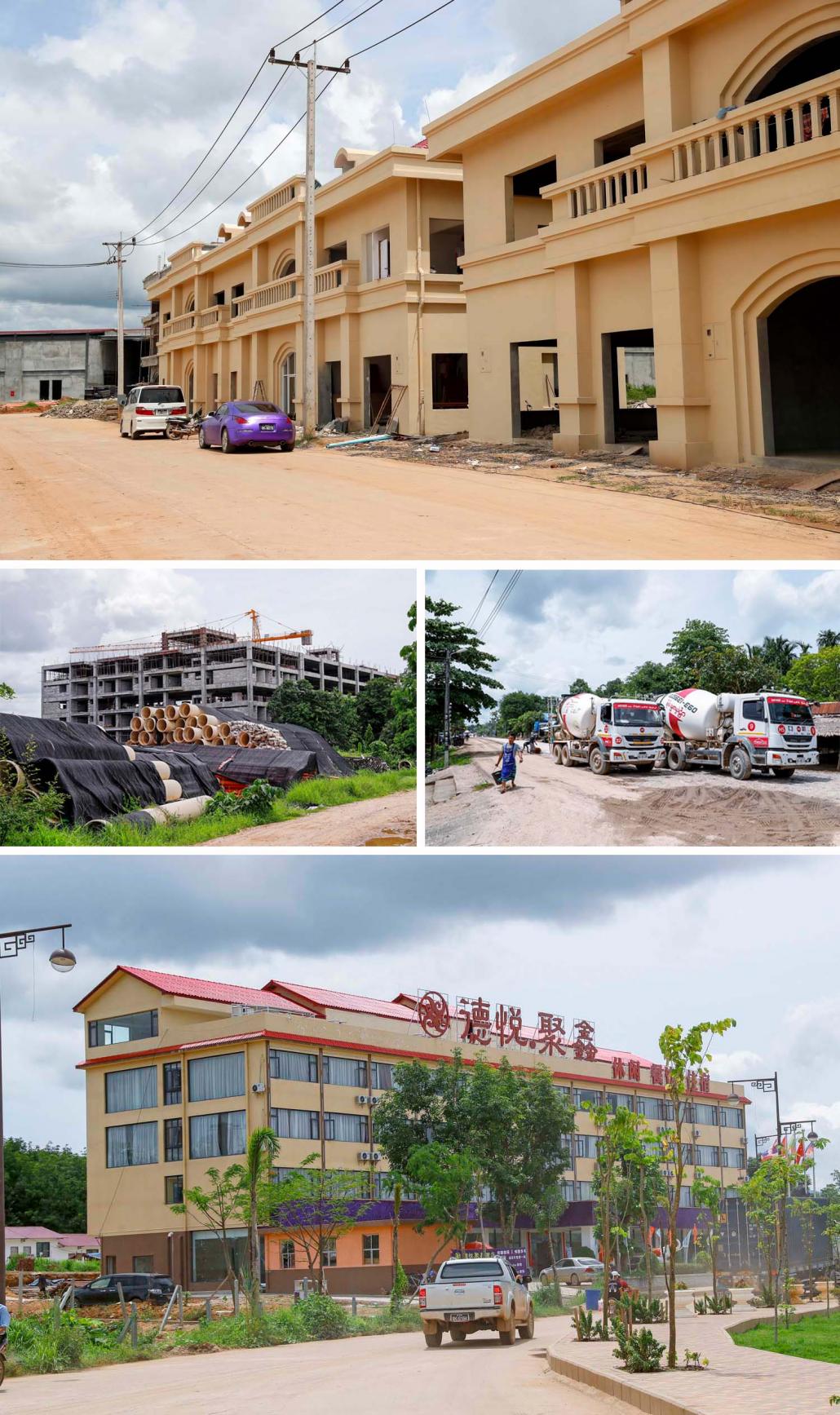
Golden Coins, a newly built hotel at Shwe Kokko, houses Myanmar Yatai workers and will target Chinese visitors. (Nyein Su Wai Kyaw Soe | Frontier)
At the project site, the BGF guards who deny access to outsiders waved Maung Win’s car into a compound surrounded by three-metre high zinc sheeting. Here, Frontier saw scores of people of Chinese appearance and buildings such as restaurants and beauty salons, all described as temporary and featuring signs in Chinese characters. The Chinese guards at the site did not welcome outsiders, and despite the presence of Maung Win, initially objected to Frontier taking photos.
During the visit to the project site, Maung Win admitted that construction had taken place outside the first phase area, where work continues on the luxury villas.
“The company will continue work on the buildings outside the first phase area because it plans to seek MIC approval for the next phase,” which will cover 70ha, he said.
“There is no problem building near the MIC-approved area as [the second phase] might be approved soon by MIC,” he added, but did not say when the application would be lodged.
MIC has confirmed to Frontier that it is yet to receive an application for the second phase.
“They didn’t apply for permission for the next phase yet. They haven’t informed us about their plans and we don’t know what their next steps for the project are,” said Daw Mya Sanda, director of Investment Division 3 at DICA.
The company cannot get permission for the second phase until the first phase is finished, she added.
Completed buildings outside the first phase area include a large hotel, Golden Coins, that Maung Win said was being used to house workers brought from China by Myanmar Yatai.
Maung Win said that when work began on the project in 2017, Myanmar Yatai told the BGF it planned to bring in more than 1,700 workers from China, who would travel via Thailand and live in 700 temporary accommodation units.
He was unable to say how many Chinese nationals were working on the project.
Asked about the inclusion of casinos in the Shwe Kokko planning proposal, Maung Win insisted that the developers had not so far included them in the project because they were illegal in Myanmar. “Casinos might be included if the law is changed,” he said.
Maung Win was apparently unaware that Myanmar’s Gambling Law was amended in May to permit casinos, but the enabling regulations were yet to be finalised. It remains unclear on what basis casinos would be permitted and how they would be regulated.
While the planning proposal states the first phase will cover 525ha and cost $500 million, Maung Win said the company later made adjustments to the proposal that changed the project area and the investment amount.
The original proposal said the project aimed to create an international city with comprehensive infrastructure that would rely heavily on information technology. It confidently predicted that the so-called Myanmar Yatai Shwe Kokko Tech City would be the leading centre for science and technology in Myanmar within five to 10 years.
Maung Win said the original plan called for the project to be completed in 2027 but acknowledged that it might be delayed.
Meanwhile, those living near the project site worry that plans to eventually build casinos and nightlife venues might have a corrupting influence on youth. They are also uncomfortable about the presence of a big Chinese population.
Saw Thar Si Htoo, who lives in Shwe Kokko village, said he had never seen the project area, but complained that it had not created jobs for locals. “The BGF said the project would provide job opportunities but there has been no work for us even though the project started more than two years ago,” he told Frontier.
There was also dissatisfaction over the compensation paid for land appropriated for the project.
Shwe Kokko village resident Saw Eh Soe said Myanmar Yatai representatives did not meet residents before work began but there had been meetings with the BGF, which had paid compensation equivalent to $1,600 an acre.
“We had demanded $4,800 an acre but they would not negotiate,” Eh Soe said, adding that those whose land was taken dared not argue with the BGF.
The Karen living in the area were sceptical about promises made by the BGF that their lives would benefit from the project, Eh Soe said.
“We don’t believe this new city will benefit us. We think this will secretly become a Chinatown.”


